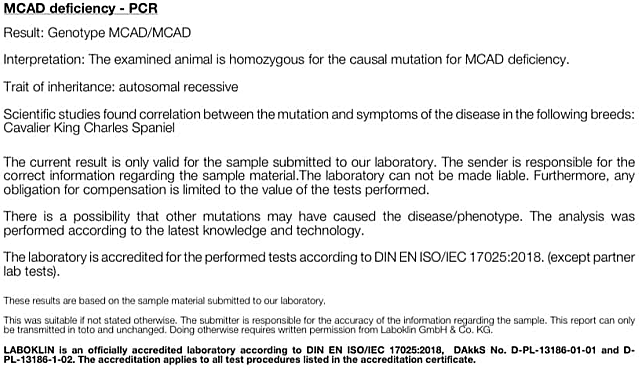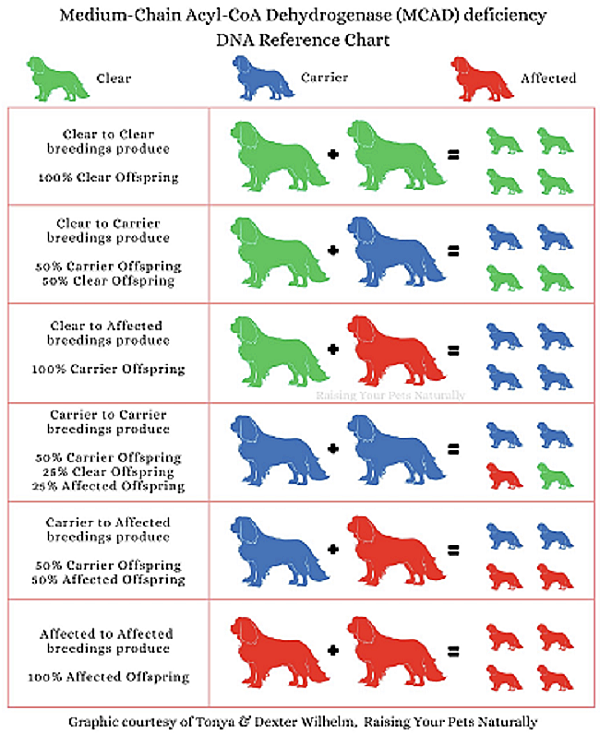Medium-chain acyl-coenzyme A dehydrogenase deficiency (MCADD) in the cavalier King Charles spaniel
-
 What It Is
What It Is - Symptoms
- Diagnosis
- DNA Testing
- Treatment
- Breeders' Responsibilities
- What You Can Do
- Foods To Avoid
- Research News
- Related Links
- Veterinary Resources
BOTTOM LINE: Cavaliers should not be fed any foods containing coconut oil or palm kernel oil or any other medium chain triglycerides (MCTs), unless (1) they have been tested and found to be clear or only a carrier of the mutated gene causing MCADD, or (2) they have been fed such MCT-foods for several months or years without having developed any seizures or other symptoms.
Medium chain triglycerides (MCTs) are fats derived mainly from coconut oil* and palm kernel oil. MCT oils have been found in some canine research studies to reduce seizure frequency in dogs diagnosed with idiopathic epilepsy. While some vendors of canine supplements claim MCT oils are of benefit to dogs diagnosed with mitral valve disease and/or dementia, there is no credible research evidence to support such marketing efforts.
Ketogenic diets**, which include adding MCTs to provide the medium chain fatty acids and ketone bodies as auxiliary brain energy, have been shown to be beneficial in treating epiletptic dogs. However, the cavalier King Charles spaniel, as a breed, is an exception to that general finding that MCTs are beneficial. Cavaliers affected with a gene mutation (described below) cannot digest MCTs, and they have been shown to be able to cause severe damage.
* Coconut oil, in
particular, also is unhealthful for dogs for other well researched
reasons. It contains a high percentage of long chain triglycerides (LCT)
fatty acids as well as a high percentage of lauric acid, which behaves
like a LCT even though classified as a MCT. Coconut oil also is over 90%
saturated fatty acids. These ingredients are known to lead to
inflammation and leaky
gut syndrome in dogs, by increasing the amount of the endotoxin
lipopolysaccharide (LPS) in the blood.
** Ketogenic diets are high in fat
content (70% to 90% of total calories) and very low in carbohydrates (3%
to 5% of total calories).
RETURN TO TOP
What It Is
 Medium-chain acyl-coenzyme A dehydrogenase is an
enzyme found in coconut oil* and palm kernel oil, which is controlled by the
ACADM gene. A protein-changing variant of the ACADM
gene causes medium-chain acyl-coenzyme A dehydrogenase deficiency
(MCADD). This deficiency is a presumably inherited disorder (an
organic aciduria) that prevents the dog's body from converting certain
fats to energy, particularly medium-chain fatty acids and particularly
during periods without food.
Medium-chain acyl-coenzyme A dehydrogenase is an
enzyme found in coconut oil* and palm kernel oil, which is controlled by the
ACADM gene. A protein-changing variant of the ACADM
gene causes medium-chain acyl-coenzyme A dehydrogenase deficiency
(MCADD). This deficiency is a presumably inherited disorder (an
organic aciduria) that prevents the dog's body from converting certain
fats to energy, particularly medium-chain fatty acids and particularly
during periods without food.
MCADD prevents the affected dogs from digesting the fats as energy sources, particularly during times of fasting or increased metabolic demands. Affected dogs cannot burn fat for energy when their bodies run out of glucose, and as a result they may suffer from low blood sugar, central nervous system disfunctions, coma, or sudden death.
Fats are one of the three essential categories of food nutrients, the others being proteins and carbohydrates. CKCSs affected with MCADD cannot digest MCTs, and so when MCTs are the primary or sole source of fats in their diets, they digest no fats. In humans, MCADD has been found to lead to severe liver disorders, atrophy of the skeletal muscles, loss of consciousness, com a, and even sudden death.
Two published studies suggest that MCADD is fairly common
among CKCSs.
 Recent statistical surveys indicate that
about 10% of all
cavaliers may be affected with MCADD and over half are carriers of the
mutation. See the data periodically reported on the Facebook group page,
"MCADD in the Cavalier King Charles Spaniel".
Recent statistical surveys indicate that
about 10% of all
cavaliers may be affected with MCADD and over half are carriers of the
mutation. See the data periodically reported on the Facebook group page,
"MCADD in the Cavalier King Charles Spaniel".
In a May 2007 article, veterinary neurologists report finding that a young cavalier, exhibiting seizures which were not controllable with anticonvulsants (potassium bromide, phenobarbital, and gabapentin), had an organic aciduria with excessively high urine excretion of hexanoylglycine. This is similar to medium-chain acyl-CoA dehydrogenase deficiency in humans.
In an October 2022 study of 162 cavaliers, researchers found that 52 of them were carriers of the protein changing variant of ACADM, and another 12 cavaliers were homozygous mutant dogs. That research was prompted by examination of a 3 year old, male neutered cavalier which displayed complex focal seizures and prolonged lethargy. The dog was found to have a single insertion deletion variant of ACADM causing the MCAD deficiency. The affected dog was treated with various dosages of levetiracetam and phenobarbital and was prescribed a low fat diet and a midnight snack consisting of carbohydrates. Prolonged periods of fasting and formulas that contained medium chain triglycerides as primary source of fat were also advised to avoid.
* Coconut oil, in particular, also is unhealthful for dogs for other well researched reasons. It contains a high percentage of long chain triglycerides (LCT) fatty acids as well as a high percentage of lauric acid, which behaves like a LCT even though classified as a MCT. Coconut oil also is over 90% saturated fatty acids. These ingredients are known to lead to inflammation and leaky gut syndrome in dogs, by increasing the amount of the endotoxin lipopolysaccharide (LPS) in the blood.
RETURN TO TOP
Symptoms
In the reported veterinary journal cases, in which 164 cavaliers were studied, symptoms displayed by MCADD-affected dogs included recurrent and cluster seizures, complex focal seizures, and prolonged lethargy. These seizures may occur several times a week and last up to 24 hours each. Left untreated, symptoms could include severe liver disorders, atrophy of the skeletal muscles, loss of consciousness, coma, and sudden death.
Not all MCADD-affected dogs will be symptomatic, because they may not consume enough MCTs compared to other fats in their diets, or because they avoid lengthy fasting between meals. Nevertheless, since affected dogs cannot digest MCTs, there is no nutritional value in feeding MCTs to them.
RETURN TO TOP
Diagnosis
Blood and urine testing shows organic aciduria with excessive excretion of hexanoylglycine, and increased medium-chain fatty acids. The clinical findings suggest a diagnosis of medium-chain acyl-CoA dehydrogenase deficiency (MCADD) .
DNA testing will confirm the diagnosis, whether the affected dog is symptomatic or not.
RETURN TO TOP
 DNA Testing
DNA Testing
Genetic testing laboratories offer a specific DNA test of the cavaliers'
saliva samples to detect whether the dogs have the mutation causing
MCADD. The laboratories will send kits with swabs to the dogs' owners to
obtain DNA samples from the dogs' mouths.
![]() Watch
this YouTube video to learn how to properly use a swab to obtain DNA from
your dog. See our Genetic Testing webpage for
more information about DNA testing.
Watch
this YouTube video to learn how to properly use a swab to obtain DNA from
your dog. See our Genetic Testing webpage for
more information about DNA testing.
In this October 2022 article, the researchers suspected MCADD from the symptoms. They sequenced the genome of the affected cavalier and compared the data to 923 control genomes of different dog breeds. The ACADM gene encoding MCAD was considered the top functional candidate gene. The genetic analysis revealed a single homozygous private protein-changing variant in ACADM in the affected dog. The current count of MCADD-affected cavaliers is 12%, and another 53% being carriers.
This variant, XM_038541645.1:c.444_445delinsGTTAATTCTCAATATTGTCTAAGAATTATG, introduces a premature stop codon and is predicted to result in truncation of ~63% of the wild type MCAD open reading frame, XP_038397573.1:p.(Thr150Ilefs*6). Targeted genotyping of the variant in 162 additional CKCSs revealed a variant allele frequency of 23.5% and twelve additional homozygous mutant dogs. The acylcarnitine C8/C12 ratio was elevated ~43.3 fold in homozygous mutant dogs as compared to homozygous wild type dogs.
Genetic testing laboratories which test for this mutation causing MCADD include:
• Canine Genetic Testing (CAGT), University of Cambridge Dept. of Veterinary Medicine
• GenSol Animal Diagnostics
• Laboklin
If a tested dog is affected, meaning it has a pair of the MCAD deficient genes, the report will look like this one:

This chart, below, shows what may be the expected offsprings of matings based upon the results of the MCT DNA test. While nature is not always this exact, the bottom three categories, breeding carriers and affecteds, aer the most likely to produce litters with affected offspring.

RETURN TO TOP
Treatment
Seizures have been found to be very difficult to control with standard medications, including levetiracetam (Keppra, Elepsia, Spritam), potassium bromide, and phenobarbital, until feeding MCTs also has been discontinued.
Dietary treatment includes discontinuing feeding foods containing MCT oils (see this list below), and avoiding prolonged periods of fasting between meals. This means feeding snacks or treats between meals each day, such as just before bedtime.
RETURN TO TOP
Breeders' Responsibilities
All breeders should have their cavalier breeding stock tested for the ACADM mutation before breeding. Tests are available at Laboklin and Canine Genetic Testing and GenSol Animal Diagnostics.
The hazards of producing offspring with the ACADM mutation are that (a) being fed MCT oils and/or (b) being fasted, can lead to seizures and worse effects of this disorder. So, if cavaliers found to have the ACADM mutation are bred, its offspring should be DNA tested, and everyone involved (breeder, owner, veterinarian) needs to be aware that if an offspring dog has the mutation, it should not ever be fed any MCT oils and it should never be fasted.
RETURN TO TOP
What You Can Do
All cavalier owners should have their cavaliers tested for the ACADM mutation before feeding them any foods containing MCT oils. Tests are available at Laboklin and Canine Genetic Testing and GenSol Animal Diagnostics.
MCT oils, including coconut oil* and palm kernel oil, should not be fed to any cavalier unless that dog first has been tested and found to be clear or only a carrier of the ACADM mutation causing the MCAD-deficiency.
One possible exception to this general rule is that if the cavalier has been fed such foods containing MCTs for several months or longer without having developed any seizures or other symptoms, the owner might assume that the cavalier is not affected, on that trial-and-error basis. However, not all MCADD-affected dogs will display symptoms, because they may not consume enough MCTs compared to other fats in their diets, or because they avoid lengthy fasting between meals. Nevertheless, all MCADD-affected dogs, whether symptomatic or not, cannot digest MCTs.
Affected cavaliers must avoid these foods which have MCTs as their primary oils or fats:
• Coconut oil*, coconut glycerin, coconut milk, coconut meal, coconut meat, coconut flour
• Palm kernel oil
• MCT oil
• Vegetable glycerin
• Goat's whole milk fat
• Cow's whole milk fat
• Butter
• Hard cheeses (especially cheddar, parmesan, gouda)
• Yogurt (some varieties, especially Greek)
• Ketogenic diets
• Caprylic acid
• Octanoic acid
Affected cavaliers must avoid the following dog foods (at least as sold in the USA), among others which contain MCTs. Be sure to check the ingredients lists on any other dog foods for coconut oil or coconut glycerin or coconut milk or coconut meat or coconut flour or palm kernel oil or MCT or "source of medium-chain triglycerides".
• Addiction Air-Dried Dog Food (all varieties)
• Addiction Dry Dog Food (some varieties)
• American Natural Premiun Market Fresh Legume-Free Fish Recipe
• Annamaet Ohana Grain-Free Puppy Formula
• Annamaet Original Senior Dog Food
• Annamaet Original Sensitive Skin & Stomach Dry Dog Food
• Annamaet Re-Juvenate Grain-Free Senior Formula
• Better Kibble for Dogs (all varieties)
• Bixbi Rawbble Dry Food for Dogs, Beef
• Bixbi Rawbble Dry Food for Dogs, Turkey
• Bixbi Rawbble Freeze-Dried for Dogs (some varieties)
• Bones & Co. Recipe Patties (all varieties)
• California Dog Kitchen Venison & Zucchini Recipe
• Castor & Pollux Organix Grain-Free (all varieties)
• Dave's Grain Free Countryside Blend
• Diamond Care Weight Management Formula for Adult Dogs
• Diamond Naturals (many varieties)
• Dr. Bob Goldstein's Wisdom Air-Dried Dog Food (all varieties)
• Dr. Harvey's Complete Meals (all varieties)
• Dylan's Pet Food (all varieties)
• Earth Animal Wisdom Air-Dried Recipes (all varieties)
• Edgard Cooper Fresh Organic Beef & Free-Range Turkey & Chicken
• Edgard Cooper Fresh Organic Free-Range Chicken
• Evanger's Game Bird Recipe with Coconut Oil
• Evolve Classic Beef, Barley & Bison Recipe Dog Food
• Evolve Classic Lamb & Brown Rice Recipe Dog Food
• Farmina N&D Quinoa Skin & Coat (all varieties)
• Go! Solutions Sensitivities Limited Ingredient Duck Dry Dog Food
• Go! Solutions Sensitivities Limited Ingredient Lamb Dry Dog Food
• Go! Solutions Sensitivities Limited Ingredient Salmon Dry Dog Food
• Go! Solutions Sensitivities Limited Ingredient Turkey Dry Dog Food
• Green Juju Freeze-Dried Blend
• Green Juju Frozen Blends (all varieties)
• Happy Howies Meat Roll (all varieties)
• Happy Howies Pro Pack (all varieties)
• Health Extension Digestive Support (all varieties)
• Health Extension Gently Air Dried (all varieties)
• Health Extension Grain Free
• Health Extension Large Bites
• Health Extension Lite Chicken & Brown Rice Recipe
• Health Extension Original Chicken & Brown Rice Recipe
• Heart and Soil Grass-Fed Lamb & Spelt Recipe
• Heart and Soil Pasture-Raised Pork & Rye Recipe
• Hill's Prescription Diet Derm Complete
• Hill's Prescription Diet Metabolic
• Hill's Prescription Diet Metabolic + Mobility j/d
• Hill's Prescription Diet Mobility j/d
• Hill's Prescription Diet c/d Multicare + Metabolic, Urinary +
• Hill's Prescription Diet ONC Care
• Hill's Prescription Diet Skin/Food Sensitivities d/d
• Hill's Prescription Diet z/d Low Fat
• Hill's Science Diet Adult Perfect Weight
• Hill's Science Diet Perfect Weight & Joint Support
• Honest Kitchen (many varieties)
• I and Love and You Nude Super Food Grain-Free Red Meat Medley Dry Dog Food
• I and Love and You Nude Super Food Grain-Free Simply Sea Dry Dog Food
• Identity Dog Food (most varieties)
• Instinct Limited Ingredient Diet Grain-Free with Real Lamb
• Instinct Limited Ingredient Diet Grain-Free with Real Salmon
• Instinct Limited Ingredient Diet Grain-Free with Real Turkey
• Jinx Dog Kibble (all varieties)
• Just Food For Dogs Balanced Remedy
• Just Food For Dogs Joint & Skin Support Complete Meal
• Just Food For Dogs Veterinary Diet Hepatic Support
• Just Food For Dogs Veterinary Diet Critical Care Support
• Ketogenic Pet Foods (all varieties)
• Lucy Pet Vegetarian Formula Dog Food
• Lyka Fish Bowl
• Lyka Lamb Bowl
• Maev (many varieties)
• Moochie Beauty Skin & Coat
• Moochie Grain Free Wet Dog Food
• Moochie Weight Control with Turkey
• Muenster Freeze-Dried Bites Free Range Elk Recipe
• Muenster Hunted and Gathered Chicken
• NAAVI Slow Roasted Bowl (all varieties)
• Nature's Diet Simply Raw Freeze-Dried Raw Whole Food Meal
• New Zealand Natural Pet Food Co. Woof (some varieties)
• Now Fresh Grain-Free Small Breed Adult Recipe Dry Dog Food
• Nutriment Enahancced Raw Diet Formula (all varieties)
• Nutriment Light Support
• Oma's Pride Woof Complete Dog Recipes
• Open Farm (many varieties)
• Organix Grain-Free (all varieties)
• OrgaNOMics Canned Dog Food (all varieties)
• Paw Foods Fresh Meals (all varieties)
• Pawstruck Air Dried Fish Recipe
• Pet Gourmet Lamb Oven Baked Kibble
• Pet Gourmet Turkey Oven Baked Kibble
• Pets Table Air-Dried Beef & Berries Recipe
• Pets Table Air-Dried Chicken & Sweet Potato Recipe
• Primal Freeze-Dried Nuggets
• Primal Kibble in the Raw (all varieties)
• Primal Pronto (all varieties)
• Primal Raw Frozen Nuggets
• Primal Raw Frozen Patties
• Primal Raw Frozen Pronto
• Purina One High Protein +Plus Vibrant Maturity
• Purina One +Plus Vibrant Maturity
• Purina Pro Plan Bright Mind
• Purina Pro Plan CC CardioCare
• Purina Pro Plan EN Gastroenteric
• Purina Pro Plan HA Hydrolyzed
• Purina Pro Plan Neurocare
• Purpose Freeze-Dried Raw Dog Food (most varieties)
• Raw Bistro Dehydrated Chicken
• Raw Bistro Dehydrated Turkey
• Raw Bistro Frozen Chicken
• Raw Bistro Frozen Turkey
• Raw Dynamic Freeze-Dried Beef Recipe
• Rayne Nutrition Ecoerm-BSFL Dry Dog Food
• Rayne Nutrition Low Fat Crocodilia MAINT Dry Dog Food
• Rayne Nutrition Low Fat Kangaroo MAINT Dry Dog Food (most varieties)
• Rayne Nutrition Plant-based Dry Dog Food
• Rayne Nutrition Low Fat Rabbit MAINT Dry Dog Food (most varieties)
• Rayne Nutrition Skin Relief Dry Dog Food
• Rockster Life-Enhancing Superfood Chickenrella
• Royal Canin Adult Selected Protein PD
• Royal Canin Adult Selected Protein PR
• Royal Canin Adult Hydrolyzed Protein PS
• Royal Canin Adult Selected Protein PW
• Royal Canin Adult Ultamino
• Royal Canin Diet Adult Vegetarian
• Royal Canin Veterinary Diet Adult Selected Protein PR Dry Dog Food
• Shine Pet Food Freeze Dried Raw Puppy Recipe
• Shine Pet Food Freeze Dried Raw Venison Recipe
• Shine Pet Food Frozen Raw Puppy Recipe
• Shine Pet Food Frozen Raw Rabbit Recipe
• Shine Pet Food Frozen Raw Venison Recipe
• Simple Food Project Bison Recipe
• Simple Food Project Lamb Recipe
• Smack Raw Dehydrated Super Food Caribbean-Salmon Fusion
• Smack Raw Dehydrated Super Food Rockin' Rockfish
• Solid Gold Air Dried Beef Recipe
• Solid Gold Air Dried Chicken Recipe
• Sprankles' Freeze-dried Raw Dog Food Beef Recipe
• Sprankles' Freeze-dried Raw Dog Food Chicken Recipe
• Stashios Meal Appeal (all varieties)
• Steve's Real Food (all varieties)
• Vivus Smokey Maple Bacun Bites
• Volhard Dog Nutrition Rescue Diet
• Wet Noses Oven Baked Food for Dogs (all varieties)
• Wisdom Air-Dried Recipes (all varieties)
• X-Dog True Beast Freeze-Dried Raw Dog Food
• Yumwoof! Perfect Kibble (all varieties)
• Yumwoof! Perfect Superfood (all varieties)
* Coconut oil, in particular, also is unhealthful for dogs for other well researched reasons. It contains a high percentage of long chain triglycerides (LCT) fatty acids as well as a high percentage of lauric acid, which behaves like a LCT even though classified as a MCT. Coconut oil also is over 90% saturated fatty acids. These ingredients are known to lead to inflammation and leaky gut syndrome in dogs, by increasing the amount of the endotoxin lipopolysaccharide (LPS) in the blood.
 Consider joining the
"MCADD in the Cavalier King Charles Spaniel" Facebook group.
Consider joining the
"MCADD in the Cavalier King Charles Spaniel" Facebook group.
Some affected dogs may not display symptoms because they either have not consumed enough MCTs or they have avoided prolonged fasting between meals. Nevertheless, since their bodies cannot digest MCTs, feeding them foods and/or supplements containing MCTs would be of no nutritional benefit.
RETURN TO TOP
Research News
December 2024:
ACKSC swabs of 100 show cavaliers finds 5% have
homozygous MCADD.
 In a December 2024 post on the ACKSC Charitable Trust website, the
results of Medium-Chain Acyl-CoA Dehydrogenase Deficiency (MCADD) swab
tests of 100 healthy cavalier King Charles spaniels at the 2024 ACKSC
national dog show were 5% having two copies of the MCADD mutation. The
study's investigator, Dr. Leslie Slusher (right), noted that none of the 5
affected cavaliers had any symptoms of the disorder. She speculated:
In a December 2024 post on the ACKSC Charitable Trust website, the
results of Medium-Chain Acyl-CoA Dehydrogenase Deficiency (MCADD) swab
tests of 100 healthy cavalier King Charles spaniels at the 2024 ACKSC
national dog show were 5% having two copies of the MCADD mutation. The
study's investigator, Dr. Leslie Slusher (right), noted that none of the 5
affected cavaliers had any symptoms of the disorder. She speculated:
"The results of our testing suggest that MCADD is a polygenic disorder with the mutant allele displaying incomplete penetrance. Another gene suppresses the MCADD phenotype in some dogs with a homozygous mutant genotype. We currently do not know the proportion of homozygous mutant dogs that display the MCADD phenotype."
She recommends continuing to breed nonsymptomatic MCADD-affected breeding stock, stating:
"Why has this disorder not been recognized by CKCS breeders? The symptoms of MCADD overlap significantly with those of SM. Is it possible that MCADD is being misdiagnosed as SM? ... Contrary to published recommendations, it is important to not remove asymptomatic homozygous mutant dogs from the breeding population. To do so is to risk losing the gene(s) that suppress the MCADD phenotype. Instead we need to attract and fund research to identify the additional genes. Comparing the genomes of asymptomatic dogs to symptomatic dogs has the potential to reveal other genes. Once the mode of inheritance is completely understood a breeding plan can be developed to effectively manage the disorder."
 EDITOR'S NOTE: We are not sure this investigator knows much about
MCADD and anything at all about syringomyelia. She suggests that MCADD
is misdiagnosed as SM! Here are some signs of her ignorance:
EDITOR'S NOTE: We are not sure this investigator knows much about
MCADD and anything at all about syringomyelia. She suggests that MCADD
is misdiagnosed as SM! Here are some signs of her ignorance:
• The main sign of MCADD is a seizure.
• SM does not cause seizures, nor does its companion disorder, Canine Chiari (CM).
• SM is diagnosed by MRI scans, not by DNA tests.
Then she goes on to recommend that if MCADD-affected cavaliers show no signs of the disorder (presumably no seizures), they should be breed anyway because, in effect, no harm - no foul! She apparently does not realize that if MCADD-affected dogs are not fed MCT oils daily, they very likely will suffer no ill effects. Yes, MCADD-affected cavaliers, if bred to MCADD-clear mates, should not produce any affected offspring, and instead only "carrier" pups. But test the mates first, and do not wily-nily just breed the "non-symptomatic" affected ones, hoping for a magic gene.
September 2023:
Cavalier's epileptic seizures increased when fed Purina ProPlan
NeuroCare for three months.
 In
a
September 2023 article, Japanese researchers (Kazumasa Nakatsuka,
Brian Zanghi, Daisuke Hasegawa [right]) investigated the
efficacy of Purina ProPlan NeuroCare, a dry (kibble) dog food "enriched"
with medium-chain triglycerides (MCTs), on seizure frequency in seven
dogs diagnosed with idiopathic epilepsy, including one cavalier King
Charles spaniel, over period of three months. The study was
sponsored by Nestle Purina Japan, and all investigators were employed or
funded by Nestle Purina Japan. They concluded overall that there was no
significant difference in seizure frequency between the MCT-food and a
placebo. However, they found that seizure activity increased in the CKCS
while being fed the MCT-enriched food.
In
a
September 2023 article, Japanese researchers (Kazumasa Nakatsuka,
Brian Zanghi, Daisuke Hasegawa [right]) investigated the
efficacy of Purina ProPlan NeuroCare, a dry (kibble) dog food "enriched"
with medium-chain triglycerides (MCTs), on seizure frequency in seven
dogs diagnosed with idiopathic epilepsy, including one cavalier King
Charles spaniel, over period of three months. The study was
sponsored by Nestle Purina Japan, and all investigators were employed or
funded by Nestle Purina Japan. They concluded overall that there was no
significant difference in seizure frequency between the MCT-food and a
placebo. However, they found that seizure activity increased in the CKCS
while being fed the MCT-enriched food.
October 2022:
Over 39% of cavaliers have medium-chain acyl-coenzyme A
dehydrogenase (MCAD) deficiency in a Swiss study.
 In
an
October 2022 Swiss study of 162 cavalier King Charles spaniels by
Matthias Christen, Jos Bongers, Deborah Mathis, Vidhya Jagannathan,
Rodrigo Gutierrez Quintana, and Tosso Leeb (right), they found
that 52 of them were carriers of the protein changing variant of the
ACADM gene, and another 12 cavaliers were homozygous mutant dogs. That
research was prompted by examination of a 3 year old, male neutered
cavalier which displayed complex focal seizures and prolonged lethargy.
The dog was found to have a single insertion deletion variant of ACADM
causing medium-chain acyl-coenzyme A dehydrogenase (MCAD) deficiency.
The affected dog was treated with various dosages of levetiracetam and
phenobarbital and was prescribed a low fat diet and a midnight snack
consisting of carbohydrates. Prolonged periods of fasting and formulas
that contained medium chain triglycerides as primary source of fat were
also advised to avoid.
In
an
October 2022 Swiss study of 162 cavalier King Charles spaniels by
Matthias Christen, Jos Bongers, Deborah Mathis, Vidhya Jagannathan,
Rodrigo Gutierrez Quintana, and Tosso Leeb (right), they found
that 52 of them were carriers of the protein changing variant of the
ACADM gene, and another 12 cavaliers were homozygous mutant dogs. That
research was prompted by examination of a 3 year old, male neutered
cavalier which displayed complex focal seizures and prolonged lethargy.
The dog was found to have a single insertion deletion variant of ACADM
causing medium-chain acyl-coenzyme A dehydrogenase (MCAD) deficiency.
The affected dog was treated with various dosages of levetiracetam and
phenobarbital and was prescribed a low fat diet and a midnight snack
consisting of carbohydrates. Prolonged periods of fasting and formulas
that contained medium chain triglycerides as primary source of fat were
also advised to avoid.
 May
2007:
Cavalier appears to have medium-chain acyl-CoA dehydrogenase
deficiency. In a
May 2007 article, US and UK clinicians (Simon Platt [right],
Yvonne L. McGrotty, Carley J. Abramson, Cornelis Jakobs) report a young
cavalier King Charles spaniel having seizures over 12 months which could
not be controlled by conventional anticonvulsants (potassium bromide,
phenobarbital, and gabapentin) until levetiracetam. The dog had an
organic aciduria and excessive urinary levels of hexanoylglycine, which
was similar to humans with medium-chain acyl-CoA dehydrogenase
deficiency.
May
2007:
Cavalier appears to have medium-chain acyl-CoA dehydrogenase
deficiency. In a
May 2007 article, US and UK clinicians (Simon Platt [right],
Yvonne L. McGrotty, Carley J. Abramson, Cornelis Jakobs) report a young
cavalier King Charles spaniel having seizures over 12 months which could
not be controlled by conventional anticonvulsants (potassium bromide,
phenobarbital, and gabapentin) until levetiracetam. The dog had an
organic aciduria and excessive urinary levels of hexanoylglycine, which
was similar to humans with medium-chain acyl-CoA dehydrogenase
deficiency.
RETURN TO TOP
RETURN TO TOP
Veterinary Resources
Refractory Seizures Associated With an Organic Aciduria in a Dog. Simon Platt, Yvonne L. McGrotty, Carley J. Abramson, Cornelis Jakobs. J. Amer. Anim. Hosp. Assn. May 2007; doi: 10.5326/0430163. Quote: A 6-month-old, female Cavalier King Charles spaniel exhibited seizures that were difficult to control with standard anticonvulsants over a 12-month period. The diagnosis of an organic aciduria with excessive excretion of hexanoylglycine was determined when the dog was 20 months old. Recurrent and cluster seizures were eventually controlled with the addition of levetiracetam to potassium bromide and phenobarbital. ... Discussion: The dog in this report was found to have excessive urinary levels of hexanoylglycine, which was similar to humans with medium-chain acyl-CoA dehydrogenase deficiency. Medium-chain acyl-CoA dehydrogenase deficiency is the most frequently described metabolic disorder of fatty-acid oxidation in humans, and it is the main cause of what has been described as primary carnitine deficiency. In this disorder, toxic levels of acyl-CoAaccumulate and impair the citric acid cycle, gluconeogenesis, the urea cycle, and fatty-acid oxidation. ... Conclusion: Seizures associated with an organic aciduria were diagnosed in a young Cavalier King Charles spaniel. Seizure activity was refractory to potassium bromide, phenobarbital, and gabapentin, but improved when levetiracetam was added to the first two drugs. Further investigation is necessary to establish an accurate prevalence of organic acidurias in dogs to develop specific treatments for these diseases.
A randomised trial of a medium-chain TAG diet as treatment for dogs with idiopathic epilepsy. Tsz Hong Lawa1a, Emma S. S. Daviesa, Yuanlong Pana, Brian Zanghia, Elizabeth Wanta, Holger A. Volk. Brit. J. Nutrition. September 2015. Quote: Despite appropriate antiepileptic drug treatment, approximately one-third of humans and dogs with epilepsy continue experiencing seizures, emphasising the importance for new treatment strategies to improve the quality of life of people or dogs with epilepsy. A 6-month prospective, randomised, double-blinded, placebo-controlled cross-over dietary trial was designed to compare a ketogenic medium-chain TAG diet (MCTD) with a standardised placebo diet in chronically antiepileptic drug-treated dogs with idiopathic epilepsy. Dogs were fed either MCTD or placebo diet for 3 months followed by a subsequent respective switch of diet for a further 3 months. Seizure frequency, clinical and laboratory data were collected and evaluated for twenty-one dogs completing the study. ... This study included twenty-one dogs of seventeen different breeds including the following: American bulldog, two Beagles, two Border Collies, Boxer, Cavalier King Charles Spaniel, English Bull Terrier, English Springer Spaniel, German Shepherd, Golden Retriever, Lhasa Apso, Mastiff, Rhodesian Ridgeback, Saint Bernard, Siberian Husky, Slovakian Rough Haired Pointer, Welsh Springer Spaniel, and three cross breeds. ... Seizure frequency was significantly lower when dogs were fed the MCTD (2·31/month, 0-9·89/month) in comparison with the placebo diet (2·67/month, 0·33-22·92/month, P=0·020); three dogs achieved seizure freedom, seven additional dogs had >50 % reduction in seizure frequency, five had an overall <50 % reduction in seizures (38·87 %, 35·68-43·27 %) and six showed no response. Seizure day frequency were also significantly lower when dogs were fed the MCTD (1·63/month, 0-7·58/month) in comparison with the placebo diet (1·69/month, 0·33-13·82/month, P=0·022). Consumption of the MCTD also resulted in significant elevation of blood B-hydroxybutyrate concentrations in comparison with placebo diet (0·041 (sd 0·004) v. 0·031 (sd 0·016) mmol/l, P=0·028). There were no significant changes in serum concentrations of glucose (P=0·903), phenobarbital (P=0·422), potassium bromide (P=0·404) and weight (P=0·300) between diet groups. In conclusion, the data show antiepileptic properties associated with ketogenic diets and provide evidence for the efficacy of the MCTD used in this study as a therapeutic option for epilepsy treatment.
Dietary intervention reduces left atrial enlargement in dogs with early preclinical myxomatous mitral valve disease: a blinded randomized controlled study in 36 dogs. Qinghong Li, Allison Heaney, Natalie Langenfeld-McCoy, Brittany Vester Boler, Dorothy P. Laflamme. BMC Vet. Res. November 2019;15:425. Quote: Background: Myxomatous mitral valve disease (MMVD), the most common naturally-occurring heart disease in dogs, is associated with alterations in energy metabolism, oxidative stress and inflammation. Energy deprivation plays a causal role in the development of heart failure. This study was designed to determine if a cardiac protection blend (CPB) of nutrients containing medium-chain triglycerides [MCTs] as an alternative energy source, fish oil to reduce inflammation, antioxidants, and other key nutrients important to cardiac health and function could slow or prevent MMVD progression. Nineteen dogs with early stage MMVD [17 Beagles and 2 miniature Schnauzers] and 17 breed-, age-, and sex-matched healthy dogs [15 Beagles and 2 miniature Schnauzers] were enrolled for a 6-month blinded, placebo-controlled study. Dogs in each cardiac health group were randomly assigned to either control diet (CON) or CPB-supplemented diet [MCTs; longchain omega-3 fatty acids; lysine and methionine (carnitine precursors); vitamin E (an antioxidant); magnesium; and taurine]. Echocardiography was performed at baseline, 3 months and 6 months. Results: No changes were found in healthy dogs. While MMVD-CON dogs had an average 10% increase over baseline in left atrial diameter (LAD) and left atrial to aortic root ratio (LA/Ao) at 6 months, MMVD-CPB dogs showed 3% decreases, resulting significant diet by time interactions (P=0.037, P=0.005, respectively). More MMVD-CON dogs progressed from stage B1 to B2 during the study. A positive correlation was found between 6-month changes in LAD and blood pressures in MMVD-CPB dogs (systolic: P=0.050, diastolic: P=0.035) but not MMVD-CON dogs. Conclusions: Our results demonstrated efficacy of CPB-based dietary intervention in reducing LA size and mitral regurgitation, and in slowing or preventing the progression of early MMVD in dogs.
Medium-chain triglycerides dietary supplement improves cognitive abilities in canine epilepsy. Benjamin Andreas Berk, Rowena Mary Anne Packer, Tsz Hong Law, Annette Wessmann, Andrea Bathen-Nothen, Tarja Susanna Jokinen, Anna Knebel, Andrea Tipold, Ludovic Pelligand, Holger Andreas Volk. Epilepsy & Behav. November 2020; doi: 10.1016/j.yebeh.2020.107608. Quote: Highlights: • Consumption of MCT oil improves the cognitive abilities in canine epilepsy. • MCT oil as 9% of total caloric intake improved spatial-working memory and problem-solving skills. • Dietary consumption of MCT increases BHB serum concentration. • Postprandial BHB serum concentration correlates with improvement in the problem-solving task. Objective: Cognitive impairments (CI) have recently been identified in canine epilepsy patients. A medium-chain triglyceride (MCT) enriched diet has been demonstrated to improve cognition in aged dogs and seizure control in canine epilepsy. This study evaluates the short-term effects of MCT-oil consumption on cognitive abilities in dogs with epilepsy, a naturally occurring animal model. Methods: A 6-month multicenter, prospective, randomized, double-blinded, controlled cross-over diet trial was conducted comparing dietary supplementation (DS) of MCT oil to a control oil. Allocation to dietary oil supplements, consisting of 9% total caloric intake, was block-randomized and supplemented into each dogs' diet for 3 months followed by a respective switch of DS-oil for a further 3 months. Noninvasive cognitive tests and a validated psychometric tool were utilized to evaluate cognitive function and perturbations associated with dietary intervention. Results: Twenty-nine dogs completed the trial, of which 18 completed noninvasive cognitive testing. Spatial-working memory, problem-solving ability, and owner-reported trainability were significantly improved during MCT-oil supplementation compared to control-DS. Significance: MCT-oil DS improves cognition in dogs with epilepsy when compared to a control-DS. MCT supplementation may represent a promising option to address CI associated with epilepsy.
Dietary medium chain triglycerides for management of epilepsy: New data from human, dog, and rodent studies. Felicity Y. Han, Lisa Conboy-Schmidt, Galena Rybachuk, Holger A. Volk, Brian Zanghi, Yuanlong Pan, Karin Borges. Epilepsia. June 2021; doi: 10.1111/epi.16972. Quote: Many studies show that glucose metabolism in epileptic brain areas can be impaired. Energy is crucial to maintain normal brain function, including ion and neurotransmitter balances. Energy deficits can lead to disruption of ion gradients, which can trigger neuronal depolarization and generation of seizures. Thus, perturbed metabolic processing of glucose in epileptogenic brain areas indicates a specific nutritional need for people and animals with epilepsy, as they are likely to benefit from auxiliary brain fuels other than glucose. Ketogenic diets provide the ketone bodies acetoacetate and B-hydroxybutyrate, which can be used as auxiliary fuel by the brain. ... In dogs, specific breeds in certain countries have shown very high prevalence of epilepsy. [Belgian shepherds, Irish wolfhounds, pugs, boxers, basset hounds, border terriers, border collies] ... The onset of epilepsy typically occurs in the first few years of life. In addition to epileptic seizures, dogs with epilepsy show behaviors similar to anxiety and attention-deficit/hyperactivity disorder in humans, as well as cognitive impairments. ... To date, several efficacy studies in dogs with idiopathic epilepsy fed with 5.5%-6.5% added MCT oil (wt/wt) or MCT oil providing 9% of daily metabolic energy requirement have been published. ... The magnitudes of the anticonvulsant effects in dogs associated with dietary MCT supplementation published are very similar to successful new ASDs in large human Phase III efficacy trials, where new drugs are tested in 200-600 patients with drug-resistant epilepsy as add-on treatment. In these trials, approximately 30%-50% of people experienced greater than 50% reduction in seizures when treatments were deemed efficacious, and the placebo showed efficacy in 10%-26% of people. On average, seizure frequencies were reduced by 26% with efficacious drugs and 13% with placebo. Taken together, these studies provide accumulating evidence of the efficacy of MCTs as an adjunct for the management of epilepsy in dogs. ... Based on the available studies, it is still unclear which MCT formulations are ideal to prevent seizure generation in people and in dogs. However, decanoic acid and MCTs containing this MCFA seem to play an important role and were more efficacious in in vitro and in vivo rodent models.
ACADM Frameshift Variant in Cavalier King Charles Spaniels with Medium-Chain Acyl-CoA Dehydrogenase Deficiency. Matthias Christen, Jos Bongers, Deborah Mathis, Vidhya Jagannathan, Rodrigo Gutierrez Quintana, Tosso Leeb. Genes. October 2022; doi: 10.3390/genes13101847. Quote: A 3-year-old, male neutered Cavalier King Charles Spaniel (CKCS) presented with complex focal seizures and prolonged lethargy. The aim of the study was to investigate the clinical signs, metabolic changes and underlying genetic defect. Blood and urine organic acid analysis revealed increased medium-chain fatty acids and together with the clinical findings suggested a diagnosis of medium-chain acyl-CoA dehydrogenase (MCAD) deficiency. We sequenced the genome of the affected dog and compared the data to 923 control genomes of different dog breeds. The ACADM gene encoding MCAD was considered the top functional candidate gene. The genetic analysis revealed a single homozygous private protein-changing variant in ACADM in the affected dog. This variant, XM_038541645.1:c.444_445delinsGTTAATTCTCAATATTGTCTAAGAATTATG, introduces a premature stop codon and is predicted to result in truncation of ~63% of the wild type MCAD open reading frame, XP_038397573.1:p.(Thr150Ilefs*6). Targeted genotyping of the variant in 162 additional CKCS revealed a variant allele frequency of 23.5% and twelve additional homozygous mutant dogs. The acylcarnitine C8/C12 ratio was elevated ~43.3 fold in homozygous mutant dogs as compared to homozygous wild type dogs. ... The dog was prescribed 40 mg/kg levetiracetam three times a day, however this resulted in severe sedation. The levetiracetam dose was therefore lowered to 25 mg/kg three times a day and 3 m/kg phenobarbital twice a day was started, which resulted in a partial response as the seizures decreased in frequency and intensity. The patient remained stable for 3 months before the seizure interval increased again and particularly the lethargy remained present up to 24 h. The dog would return to normal the following morning. An increase in the phenobarbital dose was not accompanied by an improvment. Given the unusual presentation, urine was analyzed for organic acids and revealed significant excretion of hexanoylglycine and a peak of suberic acid, highly suggestive of a fatty acid B oxidation disorder. A follow up test consisted of blood spot acylcarnitine analysis and revealed an increase in C6, C8 and C10:1 acylcarnitines, as judged against human adult reference intervals and a clinically normal dog. Extrapolating from human patients, and in comparison with the control dog, the acylcarnitine profile was consistent with a diagnosis of medium chain acyl CoA dehydrogenase deficiency. In addition to 25 mg/kg levetiracetam three times a day and 3.75 mg/kg phenobarbital twice a day, the dog was prescribed a low fat diet and a midnight snack consisting of carbohydrates. Prolonged periods of fasting and formulas that contained medium chain triglycerides as primary source of fat were also advised to avoid. This management protocol correlated with a complete resolution of clinical signs for the following 6 months. The anticonvulsant medication was therefore reduced to subtherapeutic levels. However, this was reversed as the dose reduction resulted in an increase in seizure frequency. The blood spot acylcarnitines were repeated to test sufficient free carnitine levels and these were found within normal limits. At the time of writing, the dog has been stable for 9 months on 25 mg/kg levetiracetam three times a day, 3 mg/kg phenobarbital twice a day and a low fat diet, with no further major seizures and a repeated normal neurological examination. ... We genotyped the variant in a cohort of 162 CKCS that were not closely related to the index case and sampled during an independent study (Table 2). This experiment revealed 52 heterozygous carriers and 12 homozygous mutant dogs. The genotype distribution did not significantly deviate from Hardy-Weinberg equilibrium. The frequency of the putative disease allele was 23.5% in the investigated CKCS population. ... Based on available clinical and biochemical data together with current knowledge in humans, we propose the ACADM frameshift variant as causative variant for the MCAD deficiency with likely contribution to the neurological phenotype in the index case. Testing the CKCS breeding population for the identified ACADM variant is recommended to prevent the unintentional breeding of dogs with MCAD deficiency. Further prospective studies are warranted to assess the clinical consequences of this enzyme defect.
Efficacy evaluation of a commercially available MCT enriched therapeutic diet on dogs with idiopathic epilepsy treated with zonisamide: a prospective, randomized, double‑blinded, placebo‑controlled, crossover dietary preliminary study. Kazumasa Nakatsuka, Brian Zanghi, Daisuke Hasegawa. BMC Vet. Res. September 2023; doi: 10.1186/s12917-023-03710-4. Quote: Background Idiopathic epilepsy (IE) is a common, chronic brain dysfunction in dogs. Recently, the effect of feeding a diet enriched with medium-chain triglycerides (MCTs) on seizure frequency has been evaluated in several studies in dogs with IE. However, most dogs with IE in previous studies were treated with phenobarbital as the main antiseizure medication (ASM). In Japan, zonisamide (ZNS) is the most prescribed ASM for dogs with IE. The interaction between ZNS and various nutrients including MCTs and the potential effects on treatment efficacy resulting from combining these therapies have not been previously studied. A prospective, randomized, double-blinded, placebo-controlled, crossover dietary study was conducted. Dogs (n = 7) [including 1 cavalier King Charles spaniel] treated with ZNS were fed either a placebo diet (PL) or Purina ProPlan Veterinary Diet NeuroCare (NC) for 3 months, after which treatments were crossed over and continued for another 3 months. Seizure frequency (seizures/month; sz/m), blood tests including concentrations of ZNS and B-hydroxybutyric acid, and owner's visual analogue scale score were collected from all dogs for both treatment periods. Results There was no significant difference in the seizure frequency between PL (2.95 ± 0.80 sz/m) and NC (1.90 ± 0.57 sz/m) during the 6 months of trial. Three of 7 dogs showed > 50% seizure reduction, and 1 of those 3 dogs achieved seizure freedom in NC period. However, 2 of 7 dogs had no changes in epileptic seizure frequency, 2 of 7 dogs [including the CKCS] had a deterioration in seizure frequency in the NC period. Feeding the MCT diet concurrent with ZNS showed no apparent adverse effects and did not affect ZNS concentration. Conclusions This study indicated that the commercially available MCT-enriched diet (NC) can be safely used concurrently with ZNS for dogs with IE.
Faecal Microbial Transplantation in a Cavalier King Charles Spaniel with Drug-resistant Idiopathic Epilepsy. Fien Verdoodt, Myriam Hesta , Tijmen Willemse, Luc Van Ham, Sofie Bhatti. 8th BVNS Symposium Proceedings 'microbiome and the brain'. Quote: The management of dogs with idiopathic epilepsy (IE) remains challenging, because antiseizure drugs (ASDs) are still unsuccessful in one third of the cases. Therefore, interest in innovative therapeutic targets, like the microbiota-gut-brain axis (MGBA) is increasing. Based on growing literature, the MGBA shows high potential with low associated risks and adverse effects. Therefore, the MGBA was targeted in a canine IE patient with a severe, drug-resistant phenotype via faecal microbial transplantation (FMT). A 1.5 years old female entire Cavalier King Charles Spaniel, diagnosed with IE (Tier II) at the age of 1 year, was presented at the UGent Small Animal Clinic for optimization of antiseizure management. At first presentation the dog received levetiracetam 23 mg/kg TID with a high mean seizure frequency (MSF). ASD management was adapted and phenobarbital 4.6 mg/kg BID was started, while tapering down levetiracetam. Reaching an optimal serum concentration of phenobarbital, MSF remained high and potassium bromide was added at 20 mg/kg BID but lowered to 15 mg/kg BID after 3 weeks due to side effects. The MSF did not decrease. Therefore, additional management options were discussed with the owner. Firstly, the diet was changed to a medium chain triglycerides diet (MCTD, Purina Neurocare®). Six weeks later MSF remained high and consequently FMT was performed. Fresh faeces was collected on the day of FMT together with frozen faeces the day before (to achieve an adequate amount), after donor screening. The resulting faecal slurry was given via a naso- oesophagal tube at a dose of 5g/kg. The dog was hospitalized for the procedure and received omeprazole (1 mg/kg) and metoclopramide (0,3 mg/kg) before FMT. The FMT procedure was well tolerated without adverse effects. Follow-up management included enteric coated capsules with lyophilised faeces from the same donor at 207 mg/kg twice weekly. This follow up treatment started 3 weeks after FMT, for a period of 12 weeks. Faecal samples were collected before FMT and at multiple timepoints after FMT for future assessment of the engraftment of the donor microbiome via 16sDNA sequencing. Ten weeks after the FMT, MSF showed a very mild but clinically irrelevant decrease. In conclusion, this case reports confirms safety and feasibility of FMT in a clinical case of canine IE. In this dog however, the effect on MSF was negligible. The lack of effect could be due to three main aspects. Firstly, the current protocol might have caused inadequate donor engraftment. 16sDNA sequencing will reveal performance of the protocol. Secondly, variable effects on MSF might be seen in different dogs, similar to medical and nutritional management of canine IE. Thirdly, the MGBA might not be an ideal target in the management of canine IE.
Ketogenic diets: A systematic review of current scientific evidence and possible applicability in dogs and cats. Thiago H. A. Vendramini, Andressa R. Amaral, Mariana F. Rentas, Juliana P. d. S. Nogueira, Vivian Pedrinelli, Vinicius V. de Oliveira, Rafael V. A. Zafalon, Márcio A. Brunetto. Anim. Physiol. & Anim. Nutrition. December 2023; doi: 10.1111/jpn.13913. Quote: Ketogenic diets (KD) have been used in the treatment of epilepsy in humans for around a century and, more recently, they have been implanted for cancer patients, as well as in the treatment of obesity. This type of diet consists of high-fat levels, an adequate amount of protein and restricted carbohydrates, or high medium-chain triglycerides. Recently, the ketogenic diet has gained attention in veterinary medicine and studies were published evaluating the effects of KD in dogs with epilepsy. The objective of this review was to highlight recent studies about the application of KD in dogs and cats, to describe the neurobiochemical mechanisms through which KD improves epilepsy crisis, and their adverse effects. Studies were identified by a systematic review of literature available on PubMed, Embase, and Scopus. All cohort and case-control studies were included, and all articles were exported to Mendeley® citation manager, and duplicates were automatically removed. Seven articles and three conference abstracts conducted with dogs were included in the present study. There is evidence that the consumption of diets with medium-chain triglycerides increases the concentration of circulating ketone bodies and improves epilepsy signs, although these diets have higher carbohydrate and lower fat content when compared to the classic KD.


CONNECT WITH US